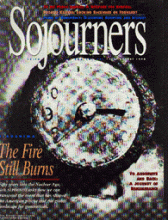"The heart of war is rape."
I was in El Salvador on a Project Via Crucis delegation when I first heard these words in 1989. They were shared with me by a friend as assurance that I was not going crazy.
I was frustrated and frightened. The nightmares, headaches, insomnia, difficulty concentrating, and intrusive memory fragments of rape and childhood sexual abuse that I began to experience after my first trip to El Salvador two years before were becoming progressively worse. Thoughts about my mother's suicide a long time ago were on my mind with increasing frequency.
At the same time, I was working hard to help build the Project Via Crucis solidarity network, as well as hold down a full-time job and raise two teen-age sons. I was angry with myself for not having better control over what was happening inside of me. I wanted to direct my energy to the Salvadoran struggle-not focus on my own pain.
Although I did not yet comprehend it, my entry into accompaniment of the Salvadoran poor in the context of war had triggered an activation of the interior conflictive zones that are the inheritance of every untreated survivor of childhood sexual abuse. A child who is sexually abused learns to survive in a war zone. Unprotected, she is subject to psychological, physical, and spiritual destruction-particularly when the abuse occurs within the context of her family.
In 1989, I had conscious memory of being raped when I was 12 by an acquaintance, and of being molested during the course of an entire summer when I was 5 by an older teen-age cousin and two of his friends. I never talked about these experiences, minimizing their significance and impact. I was unaware that other, more profoundly painful memories of sexual abuse at the hands of my mother lay deeply buried behind the walls I built as a child in order to survive.
I did know that something deep inside me was badly broken.
Read the Full Article

